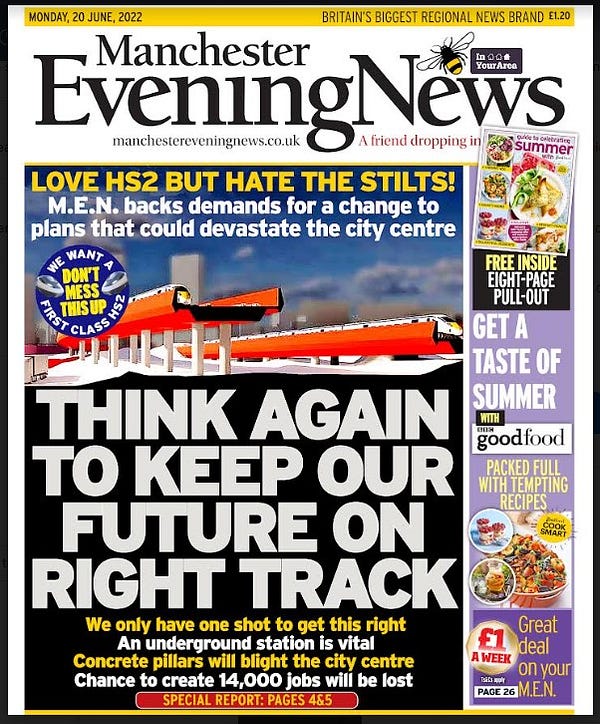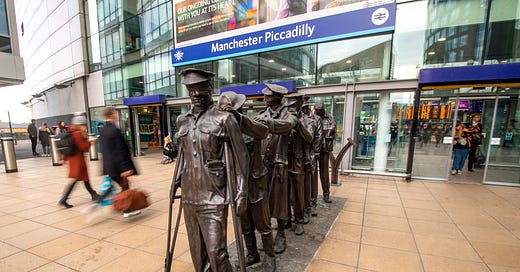HS2 has another problem, and this is a big one, literally. How do you build a huge new station in the centre of Manchester? This is a fascinating debate, one that ultimately goes to the heart of levelling up the UK. It is about long-term v short-term, how to actually spend the investment the UK needs, and who, ultimately, should be overseeing levelling up - the government or local leaders.
The debate is relatively straightforward. One side wants to build the new HS2 platforms at Manchester Piccadilly above ground, the other underground. The government is proposing to build it above ground with the track carried on stilts, but Manchester wants it underground. The government claims an underground station would add £5 billion to the cost of HS2, cause disruption in the centre of Manchester, and delay the project by seven years. However, Manchester - which includes local politicians and businesses - claim the stilts design is ugly, would rob the city of the chance to regenerate the area around the station like King’s Cross in London, and that the underground design allows HS2 to connect easily with the rest of the rail network, including the new Northern Powerhouse Rail. This side of the argument questions the cost and delays that the government is claiming the underground design would have. But it also suggests that these alleged costs and delays ultimately don’t matter anyway because the benefits of building it underground will be felt over the next hundred years.
The Manchester Evening News made its stance clear with this front page earlier in the week. This tweet was retweeted by Andy Burnham, the mayor of Manchester….


The Financial Times also ran a story about the station with quotes from local business leaders. Lou Cordwell, the chair of Greater Manchester Local Enterprise Partnership, said the stilts design was “hugely shortsighted”. That story is here. You can see the different station designs here.
The reason the station is being discussed right now is that the latest HS2 bill is going through parliament and it covers the Crewe to Manchester stretch. The bill was debated in the House of Commons on Monday evening and MPs took their opportunity to speak out. This is what Wendy Morton, the transport minister, who was representing the government in the debate, said about the Piccadilly plans:
My department has been working closely with Greater Manchester stakeholders for a long time to try to understand their reasons for supporting an underground station at Piccadilly. HS2 Ltd has considered these reasons and done extensive investigative work on the feasibility of this option. That work has found that an underground station would cause major city centre disruption during the construction period and significantly delay the opening of services into Manchester by more than seven years. It would also add around an additional £5 billion to the cost of the Crewe-to-Manchester scheme alone. That is an absolutely crazy amount of money to spend on something that is quite frankly worse.
Andrew Gwynne, the Labour MP for Denton and Reddish, which is in Greater Manchester, was among those who hit back. This is a nice summary of the other side of the debate…
I support what the Minister is saying about bringing HS2 in on budget and keeping a tight control on costs, but we also have to get best value for the taxpayer. The Piccadilly proposals are suboptimal. They will economically damage the growth potential around Piccadilly, and the interrelationship between HS2 and Northern Powerhouse Rail will be far worse than the Transport for Greater Manchester underground station option.
This is a once-in-a-century opportunity to massively improve the accessibility to Greater Manchester, through Greater Manchester and around Greater Manchester, and I welcome such an opportunity. That is why I really urge the Minister to look again at the issue of Piccadilly station.
I am really concerned about the blight that the Piccadilly station, as currently proposed, will inflict on the approach into Piccadilly. As the Minister will know, the proposal is to bring the tracks out of the ground near Ardwick and into the new Piccadilly station with a concrete platform on stilts. That will blight about half a million square metres of city centre land, and restrict the economic development around the south of Piccadilly. That is a travesty. Worse than that, it will create the situation that, almost from day one, the new Piccadilly station will be at capacity. If we are planning for the next century, let us get the infrastructure right for the next century, and that means getting Piccadilly station right.
Mike Amesbury, the Labour MP for Weaver Vale in Cheshire, said the government’s proposal was more evidence of a north-south divide. London’s HS2 stations at Euston and Old Oak Common have platforms below ground level…
If an underground station is good enough for London, why not Manchester? The scale of this investment will benefit generations to come. We have to get this right. What is good enough for London certainly should be good enough for Manchester.
Labour’s shadow transport minister Tanmanjeet Singh Dhesi finished the debate by urging the government to “look again” at the Piccadilly proposals “particularly with reference to the blight that they would inflict on Manchester and the growth opportunities that would be forgone as a consequence”.
However, Andrew Stephenson, the HS2 minister, dismissed the underground proposals and said the government would publish a report it commissioned by HS2 Limited on the costs of that idea.
Based on the report’s findings, I am absolutely confident that a surface station design will deliver what Manchester needs at a lower cost and with a lower construction impact than underground alternatives. The study has been shared with Manchester stakeholders. The Government intend to publish the report shortly, to allow everyone to have sight of the work undertaken and compare the alternative underground design options with the surface station.
There is a lot to digest from this debate, but a few things stand out. Firstly, critics of the underground scheme do not seem to dispute that it would be better in the long-term. Second, shouldn’t the government be listening more to city where this station will actually be built? Thirdly, we get too caught up with delays to projects in the UK. In 10, 20 or 100 years it will not matter that the project was late if it works. Shigeru Miyamoto, the legendary Nintendo video game designer, has a great saying on this. “A delayed game is eventually good, but a bad game is bad forever,” he said. It is vital that the government, HS2 and Manchester get this right, otherwise HS2 really will be a waste of money.
Finally, and perhaps most importantly, this debate shows a key challenge at the heart of the government’s levelling-up agenda - who decides what levelling-up looks like? The government and Manchester have conflicting visions here. The government, to be fair, has more considerations at play than just Manchester given the costs of HS2. Nonetheless, the strength of feeling in the city shows there needs to be a rethink. The regeneration around King’s Cross in London is one of the most impressive projects of its kind in the world. The area has been transformed. I followed that project for a decade and worked in the area when I was at The Guardian. Robbing Manchester of the same opportunities would surely rob HS2 of the wider benefits it is supposed to bring.
M&S v Michael Gove


Forgive me for going inside the M25 for a story, but this clash between Marks & Spencer and Michael Gove is important for all towns and cities across the UK. M&S issued a punchy statement yesterday after Gove called in the company’s proposed redevelopment of its Oxford Street store for an official review. I won’t go into the architectural debate about the quality of the building or redevelopment proposal, but some people feel really strongly that this building should be protected, like this Alex Brummer column in the Daily Mail here. However, I think this story throws up interesting issues…
This building is famous because it has been Marks & Spencer’s main shop in the UK since it opened in the 1930s. It is M&S proposing the redevelopment. Shouldn’t the business that has defined its history be trusted to decide its future?
This building is not listed, contains asbestos according to M&S and is not as striking inside or outside as other famous buildings on Oxford Street, like Selfridges. Anyone who has shopped there recently will know it is dark and dingy inside. It is not the best advertisement for M&S (ok, I have gone into the architectural debate here).
Roughly one in five units on Oxford Street are currently vacant and the street has become overrun by candy shops and souvenir shops. It urgently needs regeneration projects. Shouldn’t that be more of a focus for politicians?
This quote from Sacha Berendji, M&S’s property director, is about as openly critical of the government as I have ever heard one of the country’s best-known brands: “For a government purportedly focussed on the levelling up agenda, calling in this significant investment in one of our most iconic shopping locations will have a chilling effect for regeneration programmes across the country at a time when many town centres are being left behind and the property market is ever more precarious.” Ouch
There are clear parallels between this story and the one about Manchester station. Who decides how to level-up the UK? Again here, we see the government trying to play a central role rather than back businesses and local politicians to do what they think is best.
A chart that helps you understand the world
Inflation was 9.1 per cent in May according to official figures released this morning by the Office for National Statistics. That is up from 9 per cent in April and is another 40-year high. There is worse to come according to most forecasts, with the Bank of England pencilling in inflation of more than 11 per cent by the end of the year. Needless to say, this rate of inflation is well above the Bank’s 2 per cent target. Interestingly, the Institute of Directors has published a survey this morning that suggests 46 per cent of business leaders expect inflation to be above 2 per cent for at least another two years. The IOD surveyed 598 business leaders between 13th and the 27th of May.
You should also read this
Tom McTague at The Atlantic has written a downbeat analysis on the progress of levelling up under Boris Johnson’s government. Radical policies are needed to help level-up the UK economy, he writes, but no-one on either side of the House of Commons is discussing them. The article looks at how levelling up the economy has been the aim of politicians for many years and it usually proves beyond them. Reading this article reinforced one thing for me – businesses and entrepreneurs will play the central role, not government, if the UK is to really level up. (The Atlantic)
A useful database and survey on university spin-outs. Interestingly there is unhappiness among the founders at the time it can take to agree the spin-out with the university and the terms that universities are demanding (Spinout)
Moderna, one of the leading Covid-19 vaccine developers, is to build a factory and research centre in the UK (Telegraph)
Private equity firms are selling businesses they own to themselves in order to return cash to investors and trigger payouts for executives (FT)
UK could use national security laws to force Softbank to list Arm in London (FT)
Rolls-Royce is to base its promising mini-nuclear power station business in Manchester (BusinessLive)
The London-based venture capital firm LocalGlobal has raised a new fund to back businesses until they float (Sifted)
Offices that have been left empty on Wall Street post-Covid are being turned into apartments (Wall Street Journal)
And finally…
Best wishes to everyone heading to Glastonbury and defying the train strikes this weekend. The headliners include Billie Eilish, Paul McCartney, Kendrick Lamar and Diana Ross. I have a rather different weekend in store – I am heading to Yorkshire to do the Three Peaks Challenge. Any tips and recommendations from locals or those who have done it would be much welcome!
Thanks for reading. Off to Lunch will be back on Friday. If you want to contribute to the work of Off to Lunch, read Friday’s newsletter and attend our events then please sign up for a paid subscription below. Alternatively, please just spread the word!
Graham








